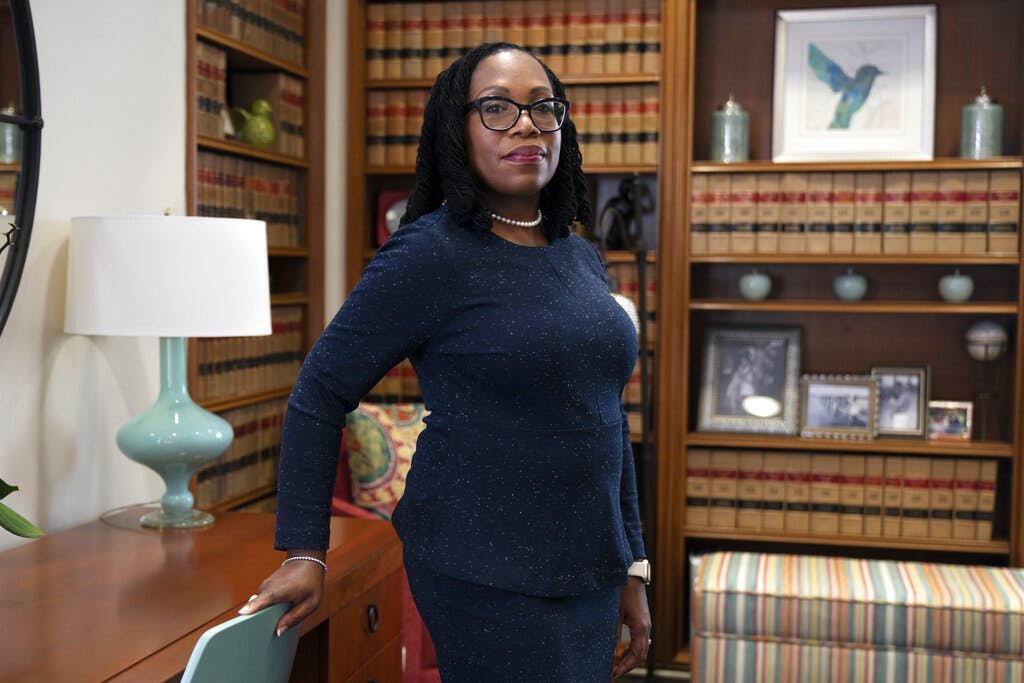Becoming Justice Jackson
The numbers suggest the court’s newest justice is also its most outspoken.

The Supreme Court’s term begins and ends on the first Monday in October, making the turn into the New Year coincide with the one-third mark on the high court’s calendar. As a Yankees philosopher, Lawrence Peter “Yogi” Berra, is reputed to have observed, it “gets late early out here.”
Following the Sage of the Bronx, it appears as if enough time is in the books to get an early sense of the Nine’s newest member. Justice Ketanji Brown Jackson was nominated from the District of Columbia Circuit of the United States Court of Appeals in February 2022, confirmed in April, and took her oath of office in June.
It’s clear, too, that she knows her away around One First Street. The high court has so far heard arguments in 27 cases during her tenure, and Justice Jackson has proved to be anything but a retiring rookie. According to SCOTUSblog, she has been “by far the most active participant in oral arguments.” She averages nearly 1,350 words an argument.
That volubility outpaces, in order, Justices Elena Kagan, Sonia Sotomayor, and Neil Gorsuch. That quartet averages between 800 and 900 words an argument. The three liberal justices, locked into the minority, appear to relish the opportunity to pontificate.
The number crunchers at SCOTUSblog note that Justice Jackson has not interjected with greater frequency than her colleagues. When she does, though, she speaks at length. She has spoken the most words in 18 of those 27 cases argued thus far, and has been especially garrulous in blockbuster cases.
Overall, Justice Jackson has spoken 30,000 more words than Justice Clarence Thomas, who broke a year-long silence from the bench in May 2020. He had previously clammed up for a decade. That gap is all the more striking given that Justice Jackson recused herself from Students for Fair Admissions v. Harvard, one of the two affirmative action cases before the high court.
It is not only Justice Jackson who is new to the court; its protocols governing oral arguments have changed as well. Post-pandemic, there is now time set aside for each justice — beginning with Chief Justice Roberts, and proceeding in order of seniority — to query the advocates arguing the case.
This continues the procedure that governed when oral arguments were held telephonically. That innovation appears to have made the Nine speak with prolixity. As Scotusblog puts it, the “justices spoke approximately 39,000 more words in the first 27 arguments this term than they did in the first three months of any term going back to 2011-12.”
Some of those words, from the mouth of Justice Jackson, have landed with particular force. She threw down a gauntlet in a voting rights case, Merrill v. Milligan, by asserting that the authors of the 14th Amendment were “trying to ensure that people who had been discriminated against — the freedmen during the Reconstruction Period — were actually brought equal to everyone else in society.”
That was not, she argued, in an implicit rebuke to Justice Thomas, a “race-neutral or race-blind idea.” The court’s senior justice has long maintained that the national parchment be read as a race-neutral document.
In a 2003 case that upheld affirmative action, Grutter v. Bollinger, Justice Thomas wrote that the Constitution “abhors classifications based on race” because “every time the government places citizens on racial registers and makes race relevant to the provision of burdens or benefits, it demeans us all.”
In Students for Fair Admissions v. University of North Carolina, the case that could reverse Grutter, Justice Jackson staked out a different position. She contrasted two applicants to the university, one white and one Black. If affirmative action falls, the latter would no longer be able to marshall “his race” and the “race of his ancestors” for his candidacy.
To that objection, the lawyer for Students for Fair Admissions, Patrick Strawbridge, retorted that the longue durée of slavery is, according to the Equal Protection Clause of the 14th Amendment, an insufficient “basis to make decisions about admission of students who are born in 2003.”
During an appearance at the Library of Congress just after her investiture, Justice Jackson proclaimed, “I have a seat at the table now and I’m ready to work.” Notwithstanding Justice Jackson’s precocity, Justice Kagan once compared adjusting to the high court to “drinking out of a fire hose,” with a learning curve so “steep, sometimes it seems vertical.”

